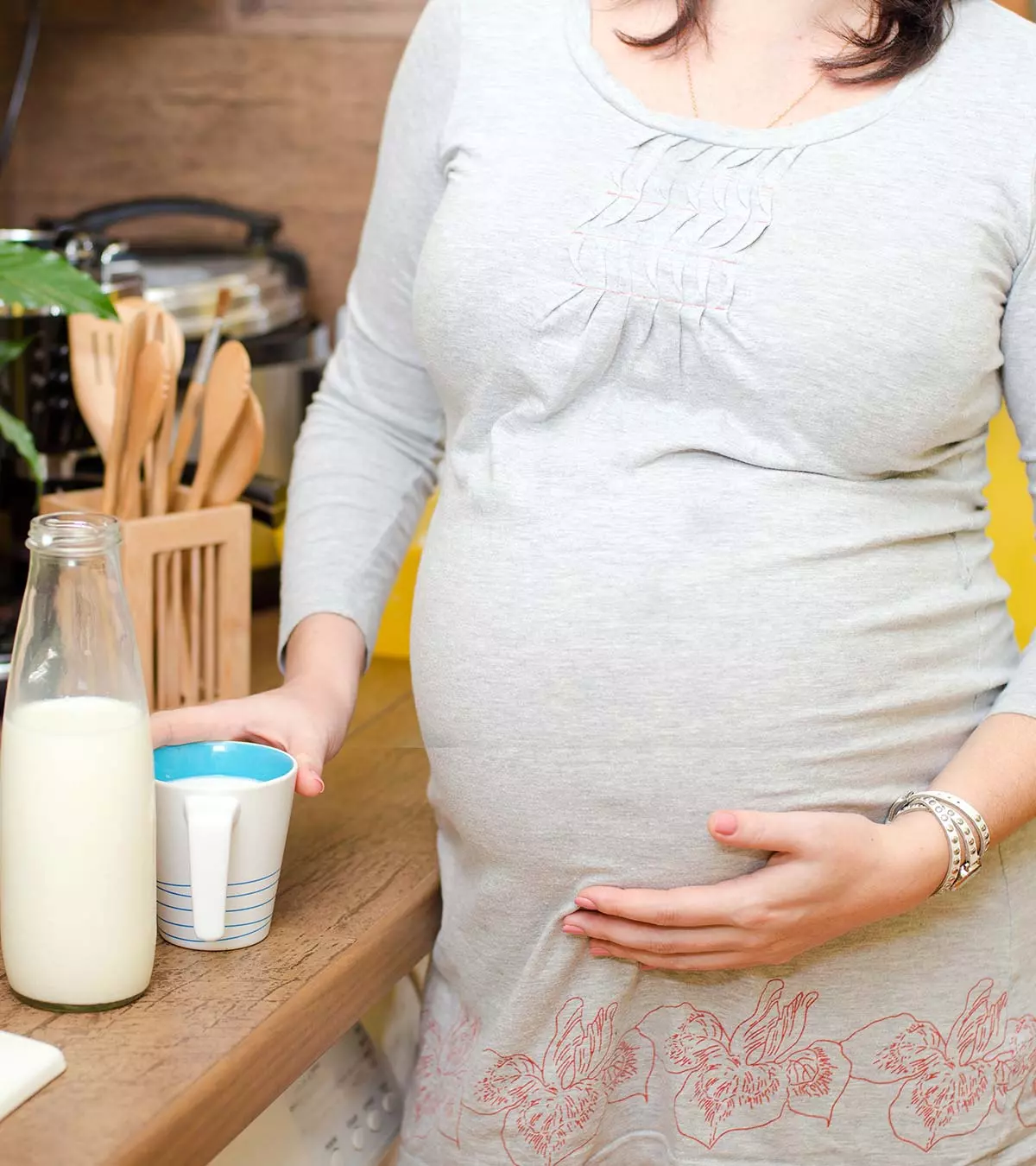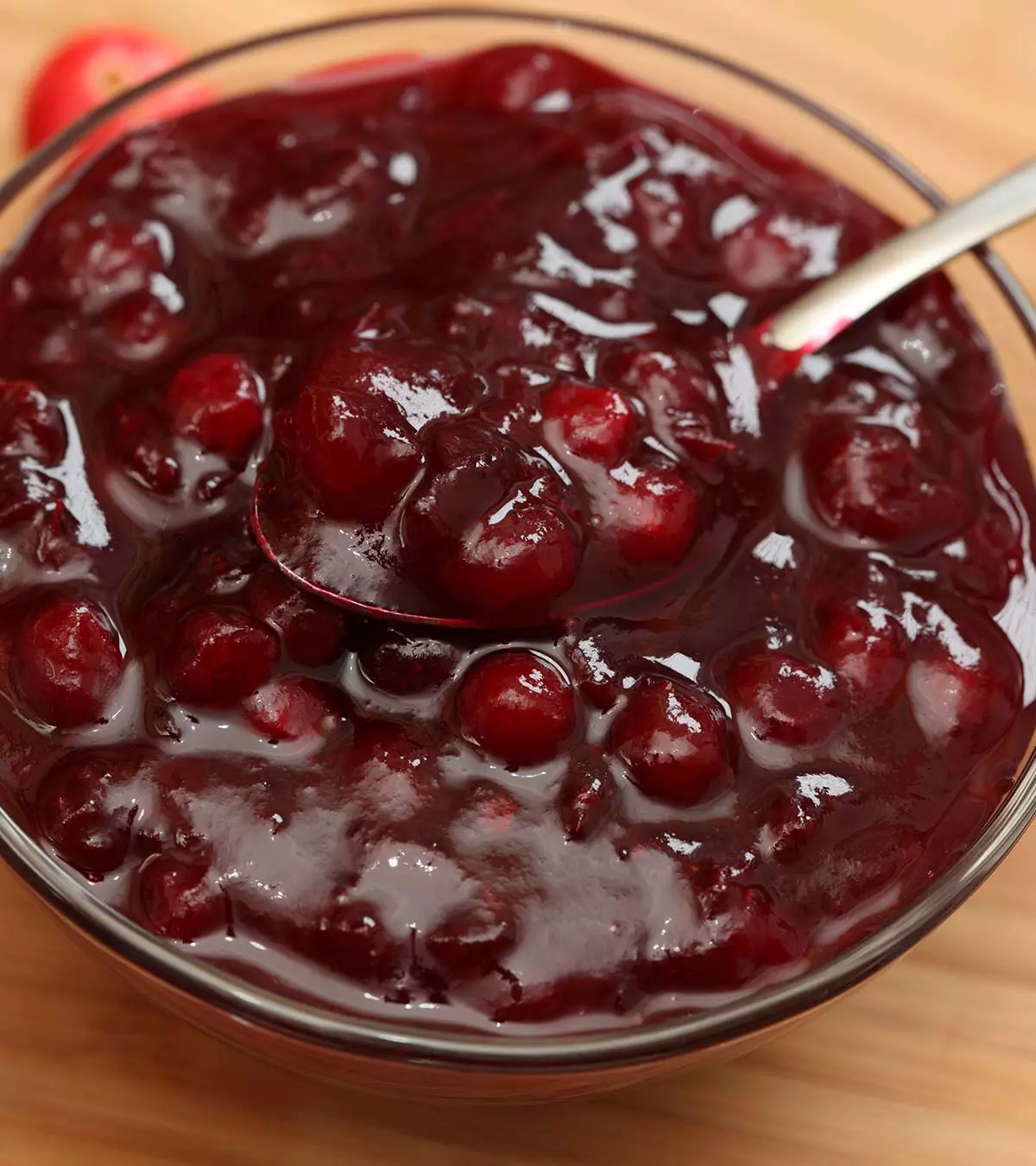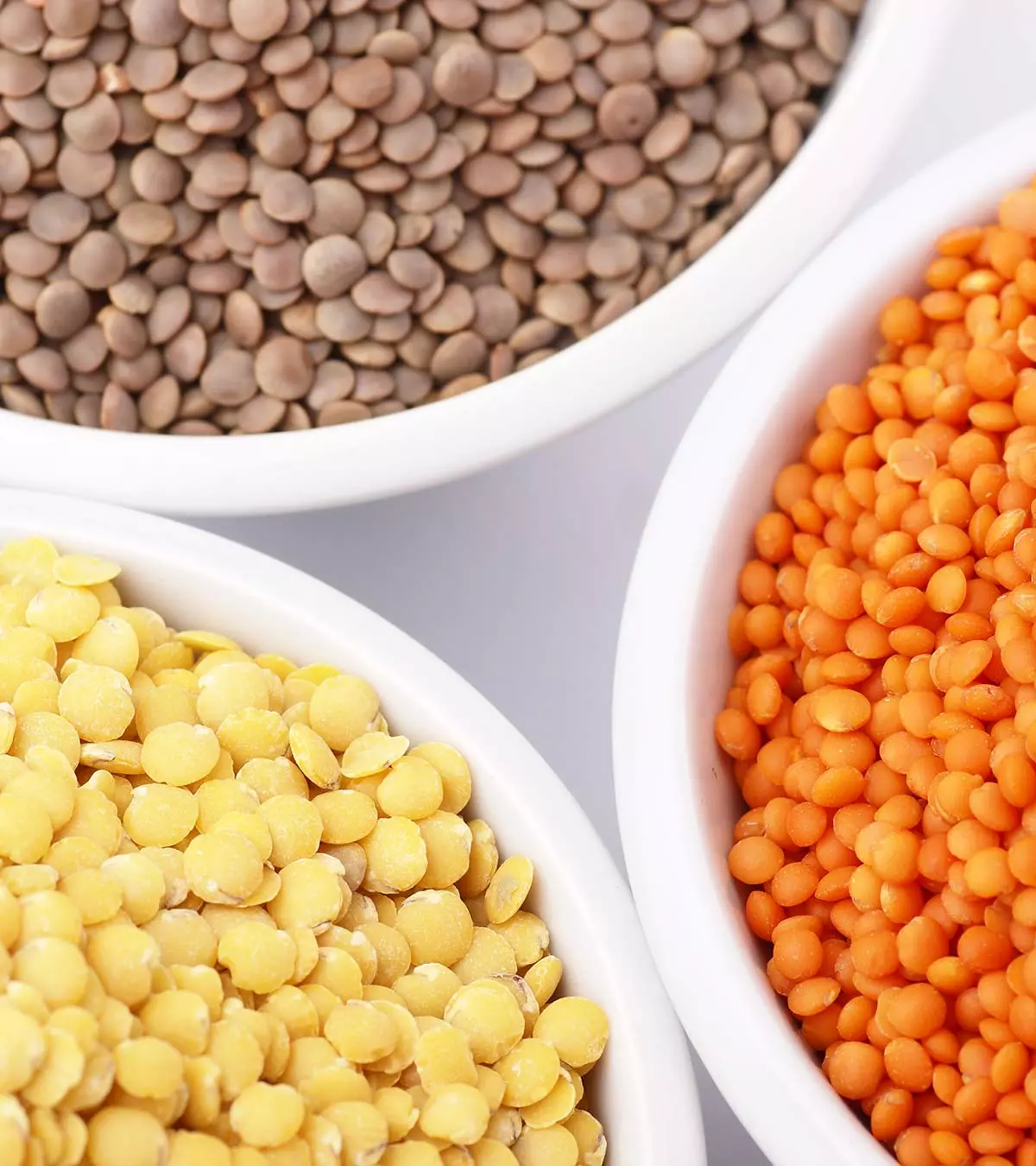
Image: Shutterstock
Most 12-month-olds are ready to move to whole cow milk, but it should not completely replace formula. So when do babies stop drinking formula?
Many parents consider switching from formula to whole cow milk when their child reaches the age of a year. It’s best to make the shift gradually. It’s also vital to understand how to shift to whole cow milk the right way. During this time, you can assist your baby in various ways.
Read on to learn when most babies will stop drinking formula and what you can do to help them.
Key Pointers
- Most experts recommend switching the babies from formula milk to whole cow milk between 12 and 18 months.
- You may give up to three cups of whole cow milk every day, along with solid foods, once your baby reaches one year.
- After one year, babies may consume whole cow milk as a part of a balanced diet for nourishment.
- However, you should not give cow milk to babies less than 12 months.
When To Stop Formula And Start Milk For Babies?
There are no set rules as to when a formula-fed baby should stop drinking it. It’s crucial to pay attention to the baby’s cues. Food readiness is an important factor when considering weaning, and most experts recommend gradual weaning between 12 and 18 months (1). When it comes to introducing age-appropriate foods, it is recommended that infants who are 12 months or older can start consuming whole cow’s milk during the weaning process (2).
According to the American Academy of Pediatrics (AAP), a baby older than 12 months may consume whole cow milk as part of a balanced diet consisting of solid foods, such as whole-grains, fruits, vegetables, pulses, dairy, and meat (3). This recommendation is made after the introduction of solids to the baby’s diet.
If your baby has sensitivity, intolerance, or allergy to cow milk-based formula or has other allergies that may affect the development of the baby’s digestive system, consult a pediatrician before introducing cow milk.
Should Babies Transition To Whole Milk?

It is a parental choice whether or not to transition to cow milk. You might want to try various other beverages and skip cow milk. But if you choose to move to cow milk, understand that weaning is a gradual process that happens over several weeks (4). Take the following measures when transitioning a baby older than 12 months to whole milk.
Tiffany, a mother, details the process of transitioning her baby from formula milk to cow’s milk. She expresses, “I intended to breastfeed C [my daughter] till she self-weans. My milk supply dropped tremendously after I was pregnant (She was 14 months then) and I wasn’t diligent in expressing milk at work. We resorted to the formula to supplement while we looked for a better option. While C was on formula, she didn’t quite finish every feed. I would say we wasted about 1/4 of each tin of formula.
“While we can still afford it at 1 tin per month (she didn’t drink a lot then), formula is expensive and we thought the money wasted could be better spent. Then I found out that some of my friends were actually offering fresh milk for various reasons. Either their babies don’t like formula or they don’t take to bottles etc. So I decided to read up a little more before I finally make the switch (i).”
- Replace one feed of formula in a day with whole cow milk. You may also consider substituting a breastfeeding session with a bottle of whole cow milk if your baby is mostly breastfed.
- Begin by introducing a cup (8fl.oz.) of whole milk in a feed. Serve whole milk in a sippy cup to reduce the risk of tooth decay associated with prolonged use of milk bottles.
- If the baby does not like the taste of whole cow milk, mix equal parts of whole milk with breast milk or prepared formula. Gradually replace breast milk or formula with cow milk. Do not directly mix formula powder with whole milk (5).
- You can serve cow milk along with solids as part of meals. It can help mask the taste of the milk.
- According to the AAP, babies from 12 to 24 months should consume two to three cups (16 to 24 ounces) of whole milk every day to increase their appetite for food and promote satiety (6). You can spread the quantity across multiple servings a day.
Do not serve more than three cups of whole cow milk a day. If you have concerns about your baby getting adequate nourishment or want to consider fortified cow milk, talk to your baby’s pediatrician.
Is Whole Milk As Nutritious As The Formula Milk?

Commercial infant formulas are easy to digest. Besides, they are fortified with essential nutrients, such as iron and vitamin C, which cow milk lacks. Therefore, formula milk should be chosen over cow milk when it comes to babies younger than 12 months.
However, formula feeding beyond 12 months may not be necessary. According to the CDC, toddlers older than 12 months do not need infant or toddler formula like a younger baby would need (4). Instead, you can serve them whole cow milk or fortified cow milk. Proper infant nutrition is crucial for babies over 12 months of age as they start to consume various solid foods to meet their nutritional needs and aid in their growth and development. Whole cow milk can become an addition to the balanced diet and provide the baby with nourishment.
Note: If toddlers experience growth lapses, developmental delays, kidney issues, or iron-deficiency anemia, pediatrician recommendations may include using formula instead of whole cow milk to ensure they reach their developmental milestones.
 Point to consider
Point to considerWhich Milk Type Is Suitable For Toddlers?

Whole cow milk is most suitable for toddlers as it contains fat that can aid in their growth and brain development (7). It also has calcium and vitamin D necessary for bone, teeth, and muscle development. It is not advisable to feed low-fat or skimmed milk (no-fat milk) to babies younger than two years.
Parents consider soy milk if the baby is allergic or intolerant to cow milk or dislikes the taste of cow milk. Research shows that individuals with milk allergy may also have an allergy to soy (8). According to the AAP, approximately half of the infants with cow milk protein allergy may also exhibit cross-reactivity to soy protein. Also, commercial soy milk available in the supermarket may not be appropriate for babies. Speak to a pediatrician for the best type of soy milk for your baby.
Parents have a variety of milk alternatives to consider, including those made from rice, oats, coconut, or almonds. However, plant-based milks (except soy) are usually not recommended for babies below two years of age due to their low fat, protein, and calcium content (9).
If your baby is allergic or intolerant to cow’s milk, speak to your pediatrician. Your pediatrician might suggest alternatives such as hydrolyzed cow milk or soy milk formula fortified with adequate nutrients necessary for the baby’s age.
 Be watchful
Be watchfulWhat Are The Other Drinks That Toddlers Can Drink After Turning One?

Whole milk and plain water are the recommended drinks for toddlers aged one and older (6). You may serve alternatives to cow milk, such as fortified soy milk, after consultation with a pediatrician.
Toddlers should not consume beverages high in sugar, additives, and preservatives. If your toddler is keen to consume fruit juice, feed them no more than four ounces (half a cup) of 100 percent fruit juice, occasionally (10). Never serve soda and energy drinks to toddlers. You can serve homemade fruit smoothies made with whole fruits and yogurt/milk in minimal quantities. Developing healthy eating habits at a young age is crucial for toddlers.
 Quick tip
Quick tipWhy Is Cow Milk Not Recommended Before 12 Months?
Unless recommended by a pediatrician, feeding cow milk before 12 months is not advisable because of the following limitations.
- There are low levels of essential nutrients, such as vitamin C, vitamin E, niacin, zinc, and quality fat in cow milk (11). These nutrients are necessary for the baby/ toddler’s healthy growth and development. During toddlerhood, it’s crucial to provide the necessary nutrients to support their physical and cognitive development.
- A high concentration of proteins and minerals in cow milk can strain the young infant’s immature kidneys (3).
- There is low iron content in cow milk when compared to breast milk and iron-fortified formula. Additionally, the calcium and casein found in whole cow milk inhibit the absorption of non-heme iron in babies younger than 12 months (12) (13).

- Its protein can irritate the gastrointestinal lining, causing occult blood loss that could lead to iron-deficiency anemia (IDA) (14).
Note:
Toddlers can also develop IDA if they consume high amounts of cow milk (more than three cups or 710 milliliters a day) in conjunction with a diet lacking in iron-rich foods (15).
Frequently Asked Questions
1. Why is formula milk not good for my baby after 12 months?
The formula is best for babies until they have reached one year, as formula milk is stacked with vitamins and iron. However, after one year, starting weaning from formula and introducing wholesome foods into your baby’s diet is essential. Switching to dairy milk is also recommended, as it provides essential nutrients like proteins and vitamin D. Continuing with formula even after 12 months may lead to a lack of nutrition in your baby (17).
2. Does my baby still need to be bottle-fed after one year?
When your baby reaches one year of age, it is recommended to start transitioning from bottle to cup. Feeding milk from bottles for a prolonged period is discouraged, as it may lead to cavities in babies (18). Additionally, introducing your child to drinking from a cup can be a developmental milestone and an exciting new experience for them.
3. Are there any potential allergies or choking hazards to consider when transitioning my baby from formula milk to solid foods?
Mash the food finely and smoothly to avoid choking hazards when transitioning your baby to solid foods. In addition, minced and shredded finger foods can also be given to babies. Common allergens include eggs, dairy, peanuts, tree nuts, and fish. Do not give them to your baby without consulting a pediatrician first. Hot dogs, raw carrots, grapes, and popcorn are other foods that can cause choking (19). Introduce solids one at a time, and be watchful of signs of allergies like hives, vomiting, diarrhea, and rashes.
4. Are there any signs that indicate my baby is not ready to transition from formula milk to solid foods yet?
Yes. Your baby will exhibit signs that indicate they are not ready to transition to solids yet. If they close their mouth tightly, turn their head away when you offer food, cry on seeing solids, and push the spoon away, they aren’t ready. Try again after some time and note their reactions (20).
5. Can I continue breastfeeding while transitioning my baby from formula milk?
Yes. breastfeeding should continue as long as it is fine for the mother and baby. But many women stop it after their baby’s first birthday. Mothers and children who aren’t ready to wean can continue breastfeeding without any concerns. It is beneficial for the immune system of the baby. According to WHO, breastfeeding should continue till your child turns two (21).
Babies can stop drinking formula and switch to cow’s milk between 12 and 18 months. However, take care that this shift is gradual and takes place over several weeks. Begin by replacing one formula feed a day with a small cup of whole milk. You could also serve milk while they eat solids. Cow’s milk is most suitable for children above 12 months. However, if your baby is allergic to it, you could consider giving them soy milk. But consult your pediatrician first to understand which alternative milk option is most suitable for babies.
Infographic: Switching Baby From Formula Milk To Whole Milk
If you’ve been thinking about introducing whole milk or cow milk to your baby, it is better to transition from formula milk when they are one year or older. However, there are certain precautions you must take when transitioning. Check out the infographic below to learn about these steps to ensure a safe transition.

Illustration: Momjunction Design Team
Illustration: When Do Babies Stop Drinking Formula?

Image: Dalle E/MomJunction Design Team
Personal Experience: Source
MomJunction articles include first-hand experiences to provide you with better insights through real-life narratives. Here are the sources of personal accounts referenced in this article.
i. Milk after 1 year old;https://2mamas4kids.wordpress.com/2016/04/12/milk-after-1-year-old/
References
1. Weaning; Healthlink BC; British Columbia
2. Cow’s milk and children; National Institutes of Health
3. Why Formula Instead of Cow’s Milk?; Healthy Children; AAP
4. Weaning From Breastfeeding; Centers for Disease Control and Prevention
5. Making the Switch to Cow’s Milk for 1-year-olds; The Children’s Hospital of Philadelphia
6. Recommended Drinks for Young Children Ages 0-5; American Academy of Pediatrics
7. Giving Your Toddler the Best Nutrition; American Academy of Family Physicians
8. Allergy and Immunology; The Royal Children’s Hospital
9. Transitioning Your Baby to Cow’s Milk; Unlock Food
10. Where We Stand: Fruit Juice; American Academy of Pediatrics
11. Alexander KC Leung, Whole cow’s milk in infancy; Paediatics Child Health; NCBI
12. Ekhard E Ziegler Consumption of cow’s milk as a cause of iron deficiency in infants and toddlers; NCBI
13. Baby’s first cup; WIC Health
14. Sandra Maria Rodrigues Fernandes, Mauro Batista de Morais, and Olga Maria Silverio Amancio, Intestinal blood loss as an aggravating factor of iron deficiency in infants aged 9 to 12 months fed whole cow’s milk; NCBI
15. Iron Deficiency Anemia; C.S. Mott Children’s Hospital
16. Cow’s Milk and Milk Alternatives; Centers for Disease Control and Prevention
17. How to tell if your baby is ready to stop drinking formula?; Cleveland Clinic
18. Stopping the bottle; Kids Health
19. Formula Feeding FAQ; Kids Health
20. Introducing solid foods for babies; Better Health
21. Weaning your child; Kids Health
Community Experiences
Join the conversation and become a part of our nurturing community! Share your stories, experiences, and insights to connect with fellow parents.
Read full bio of Mary Miller
Read full bio of Swati Patwal
Read full bio of Rohit Garoo
Read full bio of Ghazia Shah



















